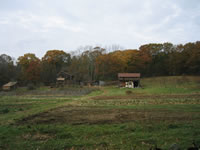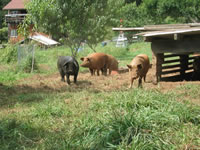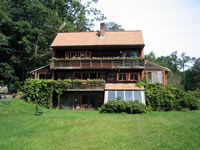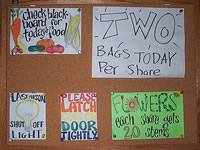About Many Hands Organic Farm
The Farm
Many Hands Organic Farm has been in existence since 1982 and has been selling to the public since 1985. We were first certified organic by the Massachusetts chapter of the Northeast Organic Farming Association in 1987. Since 2003 our certification has been handled by the Baystate Organic Certifiers since NOFA/Massachusetts no longer functions as a certifying agency. Organic certification is a process by which a third party organization sets a standard for organic production and management that the farmer adheres to. In October 2002 there came into place a National Organic Program with standards for certification that is the same for all farms across the US. Prior to this date certification was taken care of by 44 independent certifiers across the country. We at Many Hands plan to continue to be certified organic into the future.
The Ideals
Organic farming is broadly defined as a farming system that respects the balance of natural cycles and works as much as possible within those natural cycles.
Practically for us at Many Hands it means that we use no chemical fertilizers, insecticides or herbicides, that we do use natural rock powders, vegetable meals, crop rotation, heavy mulches of our own hay, cover crops, and animals in rotation with vegetables and fruits. We are very low tech, operating with a minimum of gasoline powered equipment. We presently run three Ford tractors, a 9N and an 8N from the 1940's and 1950's respectively, and a Ford 4000. We also have a Troy-Bilt rototiller and a couple of hand lawn mowers. We cut our hay with a sickle bar mower, and rake it with a ground driven rake and hand fork it onto our homemade hay cart to store loose in our hay barn. We use a small disk harrow to prepare our soil before rototilling. All cultivation and planting is done by hand.
The Family
Personnel on our farm has centered around our family labor. We are Jack and Julie and four kids, Daniel, Paul, Ellen and Charlie. Jack and Julie work for NOFA/Massachusetts, coordinate the NOFA Summer Conference, edit The Natural Farmer and do a large amount of volunteer work in the local community with music and theater.
Now all in their late twenties and early thirties, the kids are leading interesting lives. Dan is the organic farm manager for a woman in Concord and comes weekends to work in the two 25' by 100' hoop house he has in one of our fields. He and wife Roshni Prabakar live about ten minutes from us and are thoroughly enjoying their daughter Anya and son Samuel. Paul, our webmaster (like the site?), is happily married to his wife Betsy Miller Kittredge and is working for NGP Software in Washington DC. They are the proud parents of Geoffrey. Ellen is a nutritional counselor with a growing business and can be reached at ellenkittredge.com. She also lives in Washington DC. Chuk lives 45 minutes away in the Amherst area and while waiting for the muse to strike works as an apprentice carpenter and building contractor. Additionally, we have had numerous farm apprentices over the years and working adult shareholders for our CSA. Many Hands is our practice and our belief: that farming and community and enjoyment all go together.
The Community
CSA stands for Community Supported Agriculture. New to this country in 1986, it has spread like wildfire in the United States. It is a practical way for farmers and eaters to connect for mutual gain. At our farm 45 families pick up a week's share of food each of 20 weeks of the season that runs from mid-June through the end of October. Our CSA offers over 30 diferent items including a wide array of vegetables, fruits and herbs. You can learn more about our CSA here, or print and mail the CSA application here.



